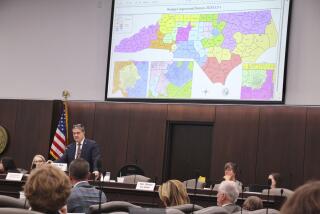Democrats Sue to Free Election Funds
WASHINGTON — The Democratic Party sued the Bush Administration on Wednesday, seeking to free millions of dollars in public matching funds that the Treasury Department is expected to deny to candidates vying in the Democratic and Republican presidential primaries.
Democrats accused President Bush of rewriting the rules for dispensing the presidential primary funds to benefit himself and harm his potential opponents.
Ron Brown, Democratic Party chairman, said the Administration’s rules reflect “cynical, manipulative political tactics” on the part of the President. He added: “George Bush is using the power of the incumbency to bully challengers and to deliberately deprive candidates of their fair share of matching funds.”
The controversy stems from a Treasury decision on how to divvy up about $127 million in presidential election money.
Earlier this year, the Federal Election Commission announced that there might be insufficient funds to finance all three components of the presidential selection process: the primaries, the party nominating conventions and the general election.
In response, the Treasury decided to set aside about $890,000 in existing funds for the nominating conventions and more than $110 million for the general election, leaving only about $16 million for requests from primary candidates in the early months of 1992.
The ruling is likely to create a cash flow shortage in February and March, depriving primary contenders of funds they are entitled to receive during those months.
The Democrats went to court after Bush, threatening a veto, dissuaded Congress from passing legislation to reverse the Treasury ruling. Democrats charged that Bush wants to take most of the public money available in the primary, leaving very little for the lesser known contenders in both parties.
An ironic aspect of the dispute is that Bush is a longtime opponent of the system of public financing that has funded presidential elections since 1976.
In their suit, the Democrats asked the U.S. District Court to direct the Treasury to give all contenders in the Democratic and Republican primaries as much money as they are legally qualified to receive when they request it early next year.
Under federal election law, all candidates for President in the primaries who raise at least $5,000 in 20 states are entitled to receive public funds equivalent to the amount of money they raise in contributions of $250 or less. These funds come from a $1 checkoff on personal income tax returns.
The potential shortfall in the election fund that sparked the disputed Treasury ruling was expected as a result of increasing costs and a decline in the percentage of Americans who designate $1 of their taxes for this purpose.
After the Treasury acted, the FEC revised its projections and now estimates that the fund will receive about $12.5 million in additional taxpayer contributions in the first four months of 1992, enough to prevent a shortfall. Like the Democrats, the FEC also opposes the Treasury’s decision to set aside money that would be needed later in the year.
Democrats noted that the Treasury ruling hurts challengers disproportionately at the very time they need money to establish name recognition among the voters to win their party’s nomination.
Furthermore, they charged that Bush will benefit most from the Treasury ruling since he has raised the largest amount of private funds and thus will qualify for the largest portion of primary matching funds before they run out.
Bush and seven other candidates already have qualified for public matching funds, and the Treasury is scheduled to begin paying out the money in early January.
More to Read
Get the L.A. Times Politics newsletter
Deeply reported insights into legislation, politics and policy from Sacramento, Washington and beyond. In your inbox three times per week.
You may occasionally receive promotional content from the Los Angeles Times.










